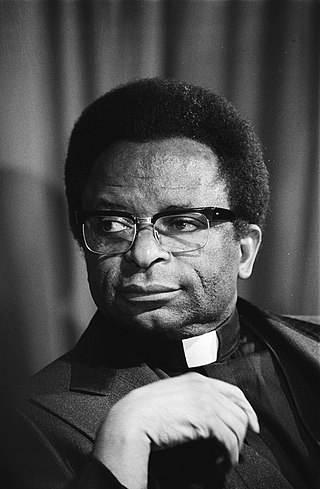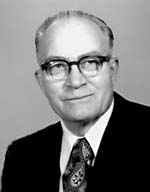Ernest Sibanda (born 25 December 1925) was either the first or one of the first black members of The Church of Jesus Christ of Latter-day Saints in what is today Zimbabwe. [1]
Ernest Sibanda (born 25 December 1925) was either the first or one of the first black members of The Church of Jesus Christ of Latter-day Saints in what is today Zimbabwe. [1]
Sibanda was born in Salisbury, Southern Rhodesia. He was raised in the Seventh-day Adventist Church by his father, who was a pastor in the church. Sibanda earned a Bachelor of Arts degree and a Bachelor of Science degree and trained to be a pastor in the Seventh-day Adventist Church. He was a pastor for three years, a teacher for nine years, and a headmaster of a school for fifteen years. He married his wife Priscilla in 1958 and eventually fathered three children.
In April 1976, during the Rhodesian Bush War, Sibanda's house was burned by Zimbabwe African National Union guerrillas who accused him of being an informant for the mostly white Rhodesian government. Sibanda and his wife walked from Salisbury to Bulawayo to try to escape hostilities.
In December 1979, Sibanda met missionaries for The Church of Jesus Christ of Latter-day Saints while working in Bulawayo. After reading from the Book of Mormon, Sibanda resolved to be baptized into the LDS Church, and he was baptized within two weeks of first meeting the missionaries. A few weeks later, in early 1980, Sibanda's wife was baptized into the church. Sibanda was the first black person to become a member of the LDS Church in Rhodesia. At the time Rhodesia was part of the South African mission and his baptism in Rhodesia preceded any post-1978 revelation baptisms of black people in South Africa itself. His progress and baptism were closely monitored by the mission president, and was one of the key factors in moving forward with the baptism in 1980 of Moses Mahlangu and some of his associates from Soweto. Sibanda was ordained a priest in the Aaronic priesthood a week after his baptism, and was later advanced to the Melchizedek Priesthood. [2]
The Sibandas experienced some difficulties in being accepted by the white members [3] of the LDS Church in Bulawayo, particularly when they were asked to serve in leadership callings in the church. Over the years Sibanda served in several callings including as branch Sunday School president, a counselor in a branch presidency and branch clerk. [4]
Sibanda was asked by the president of the South Africa Johannesburg Mission of the church to translate some of the LDS Church hymns from English into the Shona language.

Joshua Mqabuko Nyongolo Nkomo was a Zimbabwean revolutionary and Matabeleland politician who served as Vice-President of Zimbabwe from 1990 until his death in 1999. He founded and led the Zimbabwe African People's Union (ZAPU) from 1961 until it merged in 1987 with Robert Mugabe's Zimbabwe African National Union (ZANU) to form ZANU–PF after an internal military crackdown that claimed the lives of as many as 20,000 people in western Zimbabwe, mostly ethnic Ndebele ZAPU supporters.

General elections were held in Rhodesia on 30 July 1974. They saw the Rhodesian Front of Ian Smith re-elected, once more winning every one of the 50 seats elected by white voters.

The Rhodesia cricket team played first-class cricket and represented originally the British colony of Southern Rhodesia and later the unilaterally independent state of Rhodesia which became Zimbabwe. In 1980 the Rhodesia cricket team was renamed as the Zimbabwe-Rhodesia cricket team, and in 1981 it adopted its current name of the Zimbabwe national cricket team.

General elections were held in Rhodesia in April 1979, the first where the majority black population elected the majority of seats in parliament. The elections were held following the Internal Settlement negotiated by the Rhodesian Front government of Ian Smith and were intended to provide a peaceful transition to majority rule on terms not harmful to White Rhodesians. In accordance with the Internal Settlement, on 1 June, Rhodesia officially became the nation of Zimbabwe Rhodesia, under the government of the United African National Council elected in the 1979 elections. The Internal Settlement was not approved internationally but the incoming government under Bishop Abel Muzorewa did decide to participate in the Lancaster House talks which led to the end of the dispute and the creation of Zimbabwe.
The Southern Rhodesia African National Congress (SRANC) was a political party active between 1957–1959 in Southern Rhodesia. Committed to the promotion of indigenous African welfare, it was the first fully fledged black nationalist organisation in the country. While short-lived — it was outlawed by the predominantly white minority government in 1959 — it marked the beginning of political action towards black majority rule in Southern Rhodesia, and was the original incarnation of the National Democratic Party (NDP); the Zimbabwe African People's Union (ZAPU); the Zimbabwe African National Union (ZANU); and the Zimbabwe African National Union — Patriotic Front (ZANU–PF), which has governed Zimbabwe continuously since 1980. Many political figures who later became prominent, including Robert Mugabe and Joshua Nkomo, were members of the SRANC.

Air Rhodesia Flight 825 was a scheduled passenger flight that was shot down by the Zimbabwe People's Revolutionary Army (ZIPRA) on 3 September 1978, during the Rhodesian Bush War. The aircraft involved, a Vickers Viscount named the Hunyani, was flying the last leg of Air Rhodesia's regular scheduled service from Victoria Falls to the capital Salisbury, via the resort town of Kariba.

William Hunter Bennett was a general authority of the Church of Jesus Christ of Latter-day Saints from 1970 until his death.
Moses Mahlangu was a long-time supporter of the teachings of the Church of Jesus Christ of Latter-day Saints in South Africa. Mahlangu first found a copy of the Book of Mormon sometime in the 1960s. At the time, he was a Christian preacher in South African townships.

The history of the Jews in Zimbabwe reaches back over one century. Present-day Zimbabwe was formerly known as Southern Rhodesia and later as Rhodesia.
Tichafa Samuel Parirenyatwa was Zimbabwe's first trained black physician, medical doctor and the first vice-president of the Zimbabwe African People's Union (ZAPU). He rose to prominence during ZAPU's political struggle against the colonial administration in Southern Rhodesia.

Since Mormonism’s foundation, Black people have been members, however the church placed restrictions on proselytization efforts among black people. Before 1978, black membership was small. It has since grown, and in 1997, there were approximately 500,000 black members of the church, mostly in Africa, Brazil and the Caribbean. Black membership has continued to grow substantially, especially in West Africa, where two temples have been built. By 2018, an estimated 6% of members were black worldwide. In the United States, approximately 1% of members are black.

The Geneva Conference took place in Geneva, Switzerland during the Rhodesian Bush War. Held under British mediation, its participants were the unrecognised government of Rhodesia, led by Ian Smith, and a number of rival Rhodesian black nationalist parties: the African National Council, led by Bishop Abel Muzorewa; the Front for the Liberation of Zimbabwe, led by James Chikerema; and a joint "Patriotic Front" made up of Robert Mugabe's Zimbabwe African National Union and the Zimbabwe African People's Union led by Joshua Nkomo. The purpose of the conference was to attempt to agree on a new constitution for Rhodesia and in doing so find a way to end the Bush War raging between the government and the guerrillas commanded by Mugabe and Nkomo respectively.

The Victoria Falls Conference took place on 26 August 1975 aboard a South African Railways train halfway across the Victoria Falls Bridge on the border between the unrecognised state of Rhodesia and Zambia. It was the culmination of the "détente" policy introduced and championed by B. J. Vorster, the Prime Minister of South Africa, which was then under apartheid and was attempting to improve its relations with the Frontline States to Rhodesia's north, west and east by helping to produce a settlement in Rhodesia. The participants in the conference were a delegation led by the Rhodesian Prime Minister Ian Smith on behalf of his government, and a nationalist delegation attending under the banner of Abel Muzorewa's African National Council (UANC), which for this conference also incorporated delegates from the Zimbabwe African National Union (ZANU), the Zimbabwe African People's Union (ZAPU) and the Front for the Liberation of Zimbabwe (FROLIZI). Vorster and the Zambian President Kenneth Kaunda acted as mediators in the conference, which was held on the border in an attempt to provide a venue both sides would accept as neutral.

The modern political history of Zimbabwe starts with the arrival of white people to what was dubbed Southern Rhodesia in the 1890s. The country was initially run by an administrator appointed by the British South Africa Company. The prime ministerial role was first created in October 1923, when the country achieved responsible government, with Sir Charles Coghlan as its first Premier. The third Premier, George Mitchell, renamed the post Prime Minister in 1933.

Three missionaries of the Church of Jesus Christ of Latter-day Saints started proselyting to white English-speaking people in Cape Town in 1853. Most converts from this time emigrated to the United States. The mission was closed in 1865, but reopened in 1903.The South African government limited the amount of missionaries allowed to enter the country in 1921 and in 1955. Starting around 1930, a man had to trace his genealogy out of Africa to be eligible for the priesthood, since black people were not permitted to be ordained. In 1954 when church president David O. McKay visited South Africa, he removed the requirement for genealogical research for a man to be ordained, stipulating only that "there is no evidence of his having Negro blood in his veins".

The Church of Jesus Christ of Latter-day Saints in Nigeria refers to the Church of Jesus Christ of Latter-day Saints and its members in Nigeria. At year-end 1983, there were 2,255 members in Nigeria. In 2022, there were 221,172 members in 769 congregations making it the largest body of LDS Church members in Africa.

The Church of Jesus Christ of Latter-day Saints in Zimbabwe refers to the Church of Jesus Christ of Latter-day Saints and its members in Zimbabwe. In 1975, there were 689 members in Zimbabwe. In 2022, there were 38,289 members in 91 congregations, in 8 stakes.
Edward Dube has been a general authority of the Church of Jesus Christ of Latter-day Saints since April 2013. He is the first Zimbabwean and the second black African to be a general authority.
The Baptist Convention of Zimbabwe is a Baptist Christian denomination in Zimbabwe. It is affiliated with the Baptist World Alliance and the Evangelical Fellowship of Zimbabwe. The headquarters is in Gweru.
Lazarus Nkala, known in political circles by the nickname UMavava, was a Rhodesian trade union leader, activist, and revolutionary. Born in Filabusi in Matabeleland, he attended mission and government schools and trained as a builder. He worked in Bulawayo, and became a union leader and African nationalist activist. In the 1950s and 60s, he served in leadership roles in the Southern Rhodesia African National Congress, National Democratic Party, and Zimbabwe African People's Union. He was detained in 1964 and, with the exception of a three-week period the following year, was held in continuous detention for the next ten years. Upon his release in 1974, he was named Organising Secretary of the ANC, and attended the Victoria Falls Conference as part of Joshua Nkomo's delegation. He died shortly after in an automobile accident driving from Salisbury to Bulawayo.